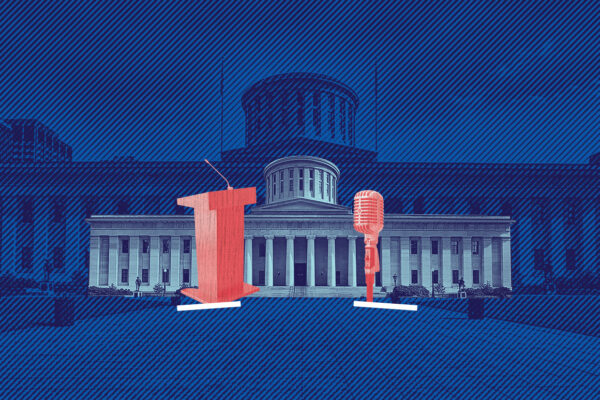To Chairman Johnson, Vice Chair Wilson, Ranking Member Weinstein, and members of the Senate Armed Services, Veterans Affairs & Public Safety Committee, thank you for this opportunity to provide opponent testimony on Senate Bill 172.
Senate Bill 172 has been framed by its sponsor as preventing and outlawing future situations similar to, and the same as, the recent controversy in Boston involving a municipal judge, a person with business before her court, and Immigration Customs and Enforcement (ICE). It was also claimed SB 172 will override two local rules recently adopted by the Franklin County Common Pleas Court prohibiting the arrest of persons, without a judicial warrant or judicial order, in a courthouse or on courthouse grounds.
While such a goal, by itself, raises questions about the separation of powers between the legislature and judiciary, SB 172 can also be easily interpreted as doing much more. Indeed, SB 172 can be read as authorizing state and local law enforcement to enforce federal immigration laws.
ENFORCEMENT OF IMMIGRATION LAWS
I trust this committee knows, and as the sponsor acknowledged during her testimony, immigration laws are federal laws. Therefore, the responsibility for enforcing those immigration laws belongs to the federal government. State and local law enforcement are permitted to provide specific, limited assistance, subject to formal processes and prior approvals. However, SB 172 could or would allow much more.
ICE DETAINERS
When local law enforcement detains a suspect and ultimately processes them for admittance into jail, their identities are run through databases, including to ultimately determine the immigration status of the person detained.
Sometimes, when ICE has particular interest in a person detained, who is suspected or known to be an undocumented immigrant, they will formally send that jail a detainer request. This request asks the jail to hold the person up to 48 hours - after they are otherwise free to go – to give ICE time to take physical custody of the suspect.
This presents constitutional problems. That is, the ICE detainer request is just that – a request. Not a legal requirement. Plus, as mentioned, the person in question is otherwise free to go, having at least temporarily resolved any local or state legal matters keeping them detained in jail. Without a warrant authorizing ongoing detention, local jails run the risk of lawsuits (and paying monetary damages) arguing this continued detention without a warrant is a constitutional violation. Indeed, courts increasingly agree this extended detention, because of ICE detainer requests, is unconstitutional.
However, SB 172 rejects or ignores all this, with its outlawing of any local law, policy, etc. that has the effect of, or purpose to:
Obstruct or otherwise interfere, directly or indirectly, with a federal, state, or local law enforcement agency or officer who is arresting or detaining a person, taking a person into custody, or holding a person in custody as permitted under division (B)(1) of this section; (Lines #45-49) and:
Subject to protections afforded under the United States Constitution and the Ohio Constitution, and notwithstanding any contrary provision of the Revised Code, no person who is, or is suspected of being, unlawfully present in the United States is privileged from arrest, detention, or being taken into or held in custody by a federal, state, or local law enforcement agency anywhere in this state under any circumstances, with or without a warrant, and regardless of whether the proceedings are administrative, civil, or criminal in nature, for removal or other immigration related purposes or proceedings. (Lines #20-30)
If it is not the intention of SB 172 to prohibit local laws and policies regarding ICE detention requests and noncooperation with those efforts, it should be amended accordingly.
LOCAL & STATE LAW ENFORCEMENT ENFORCING FEDERAL IMMIGRATION LAW
SB 172’s language can also be interpreted as granting local and state law enforcement broad authority to enforce, via arrest, detainment, and jailing, federal immigration laws, absent any formal agreement or arrangement with the federal government, as required. Again:
Subject to protections afforded under the United States Constitution and the Ohio Constitution, and notwithstanding any contrary provision of the Revised Code, no person who is, or is suspected of being, unlawfully present in the United States is privileged from arrest, detention, or being taken into or held in custody by a federal, state, or local law enforcement agency anywhere in this state under any circumstances, with or without a warrant, and regardless of whether the proceedings are administrative, civil, or criminal in nature, for removal or other immigration related purposes or proceedings. (Lines #20-30) (Lines #20-30)
While it is true SB 172 contains language “subject to protections afforded under the United States Constitution and the Ohio Constitution,” we do not believe that language necessarily limits law enforcement and local governments from detention of people pursuant to ICE retainer requests or larger aspects of immigration law enforcement by local entities.
SEPARATION OF POWERS
SB 172 intrudes upon wholly judicial matters by the legislature. This includes the authority and ability of judges, in this context, to enact and enforce policies and rules regarding their courtrooms and to issue a variety of rulings and orders.
At the ACLU of Ohio we are not experts regarding separation of powers issues. It is not an issue typically central to or relevant to our work. Surely, others with more experience and knowledge can and will weigh in on this matter. But we also note this general issue has been present with recent legislative attempts to restrict and end policies regarding the carrying of weapons in a court room. With regard to that controversy, judges have maintained those legislative efforts violate separation of powers. Given that, it is hard to imagine SB 172’s mandates and prohibitions will not lead them to the same conclusion.
In conclusion, if SB 172’s language is eventually explicitly limited to the conduct of judges and court actions, there will still be problems. If SB 172 is, indeed, meant to apply to all kinds of other immigration-related situations, actions, and enforcement, only some of which are identified in this testimony, then there are numerous, additional problems and concerns. For these reasons and more, the ACLU of Ohio urges this committee’s rejection of Senate Bill 172.



